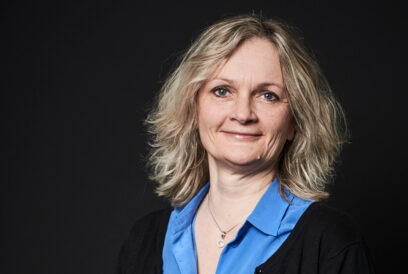

Fischer, Merja. (2012). Linkages between employee and customer perceptions in business-to-business services – Towards positively deviant performances. Doctoral dissertation 7/2012. Aalto University. School of Science Department of Industrial Engineering and Management. Laboratory of Work Psychology and Leadership. Helsinki: Unigrafia. The dissertation under review studies how employees’ perceptions of their supervisors, workplace climate, internal quality and
Fischer, Merja. (2012). Linkages between employee and customer perceptions in business-to-business services – Towards positively deviant performances. Doctoral dissertation 7/2012. Aalto University. School of Science Department of Industrial Engineering and Management.
Laboratory of Work Psychology and Leadership. Helsinki: Unigrafia.
The dissertation under review studies how employees’ perceptions of their supervisors, workplace climate, internal quality and personal engagement impact on customers’ perceptions of service quality.
The author Merja Fischer, PhD, is CEO Entrepreneur at POSemotions OY. Before this she has worked in the marine industry for Wärtsilä Corporation.
Her passion for her research topic “has emerged from the urgency to find ways of creating flourishing organizations with happy employees and happy customers.”
The study explores the means to foster “positively deviant” service businesses using the broaden-and-build theory of positive emotions by Fredrickson as well as other studies and theories in positive organizational scholarship.
Workplace climate predicts customer satisfaction
Fredrickson’s theory argues that positive emotions broaden the mind and increase personal resources such as intellectual, social, psychological and psychical resources. Increased personal resources create positively deviant performances, such as trust in self and others, creativity, feeling of oneness and seeing the bigger picture. Increased personal resources impact on individual well-being and foster positively deviant behaviors by enhancing mutually beneficial processes of the co-creation of the service value, namely productivity and profitability.
In Part I of her research Fischer tests a model explicating employees’ perceptions of their organization and customers’ perceptions of service quality. The empirical data concern 38 service business units worldwide in an international corporation in the field of power solutions for the marine and energy market. The research data consists of employee data collected in 2007 (n=2403) and customer data collected between 2007- 08 (n=1987). The statistical method of structural equation and path modeling are used in the theory testing.
The study shows the relevance of the physical and psychological closeness of the employees and customers as a key parameter for the structure of the linkage. Thus the results presented in this thesis suggest that account managers’ perceptions of workplace climate predicts customers’ perceptions of service quality, whereas in the case of field service engineers, their personal engagement predicts customers’ perceptions.
Trust-creating is everybody’s task
Workplace climate encompasses concepts such as support climate and team climate. Team climate relates closely to workplace relationships such as openness, respect, teamwork, high morale and atmosphere. Support climate, in turn, consists of concepts related to managerial and organizational support such as target setting, communication, fairness and management involvement and support for individual development.
Personal engagement measures the level of an individual’s commitment to organizational target setting. This factor also measures how individuals perceive the world around them, their willingness and capability to achieve organizational goals as well as how the organization’s human resource management (HRM) supports individual development.
These two employee groups, account managers and field service engineers, interact with customers in different ways. Account managers contact customers most often by phone or email whereas field service engineers conduct the maintenance work on the customer premises.
Consequently, it can be suggested that customers’ perceptions of quality provided by employees is based on an entire organization’s capability to create trust and reliability in their interactions with customers, either through their Personal Engagement or through the Workplace Climate.
The results provide also grounds for recognizing the importance of the role played by supervisors and peers in the creation of such an organizational climate that enhances employees’ positive perceptions of their workplace and its relationships.
New model of positively deviant performance
In addition to theory testing, the study makes a theoretical contribution by connecting the service marketing perspective with some insight from positive organizational scholarship in the Part II. This part of the dissertation suggests that positively deviant service business can also be generated through a collective effort in the workplace and is fostered through individual member’s broaden-and-build processes. The experiencing of positive emotions does not only increase the level of individuals’ emotional well-being, but also builds their inner strength that helps them to survive through hard times.
By connecting previous studies and literature Fischer builds a new model of positively deviant performances – such as appreciation, gratitude, helping others, trustworthiness and unselfishness. Leaders who focus on the positive means, such as listening, inspiring and energizing others will cultivate the creation of a climate for positivity. Positively deviant performance means outcomes that dramatically exceed common or expected performance.
Transferable findings
In spite of the fact that Fischer has made her study in the field of power solutions for the marine and energy market the outcomes could be applied more widely to all work organizations. This study gives also many practical implications how every person could affect her/his workplace by choosing positive behaviors instead of negative or neutral ones. Every encounter is an opportunity to transfer an ordinary event to a positive event carrying positive meaning. Positive meaning creates positive emotions. Positive emotions are associated with enhanced psychological functioning, including higher levels of well-being and lower levels of mental health problems.
Positively deviant behavior and virtuousness have a close connection. Virtuousness is associated with what individuals and organizations aspire to be when they are at their very best. The concept of virtuousness could be connected to learning organization where people continually expand their capability to create the results they truly desire, where new and expansive patterns of thinking are nurtured, where collective aspiration is set fee, and where people are continually learning how to learn together.





